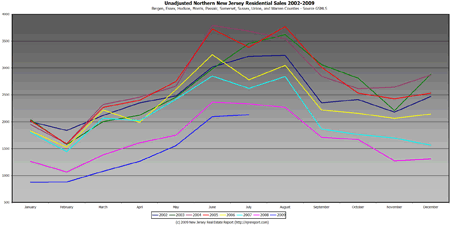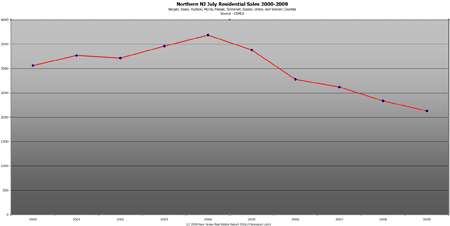Hat tip to ww4b for the Hunterdon and Warren comp killers, more to follow.
Hunterdon Comp Killers
660 County Rd 579, Alexandria Twp NJ
Purchased: 9/17/2004
Purchase Price: $440,000
MLS# 2670578
Listed: 4/2/2009
List Price: $429,000
Sold: 7/24/2009
Sale Price: $397,000
10% under the 2004 sales price
27 Inverrary Pl, Clinton Twp NJ
Purchased: 11/05/2004
Purchase Price: $330,000
MLS# 2651966
Listed: 2/20/2009
List Price: $359,900
Sold: 7/16/2009
Sale Price: $325,000
1% under the 2004 sales price
24 Willow Brook Ln, Clinton Twp NJ
Purchased: 2/1/2006
Purchase Price: $725,000
MLS# 2637608
Listed: 1/27/2009
List Price: $675,000
Sold: 7/1/2009
Sale Price: $590,000
18% under the 2006 sales price
81 Crestview Dr, Clinton Twp NJ
Purchased: 9/14/2005
Purchase Price: $762,000
MLS# 2677335
Listed: 4/26/2009
List Price: $675,000
Sold: 7/31/2009
Sale Price: $625,000
18% under the 2005 sales price
67 Crestview Dr, Clinton Twp NJ
Purchased: 3/30/2006
Purchase Price: $720,035
MLS# 2685869
Listed: 5/27/2009
List Price: $699,500
Sold: 7/30/2009
Sale Price: $650,000
10% under the 2006 sales price
88 Amwell Rd, East Amwell Twp NJ
Purchased: 9/18/2006
Purchase Price: $549,000
MLS# 2686676
Listed: 5/29/2009
List Price: $524,980
Sold: 7/24/2009
Sale Price: $488,000
11% under the 2006 sales price
1607 Spruce Hills Dr, Glen Gardner NJ
Purchased: 3/31/2006
Purchase Price: $163,000
MLS# 2688041
Listed: 6/23/2009
List Price: $150,000
Sold: 7/29/2009
Sale Price: $150,000
8% under the 2006 sales price
6 Manning Ct, High Bridge NJ
Purchased: 7/28/2004
Purchase Price: $419,000
MLS# 2673988
Listed: 4/15/2009
List Price: $399,900
Sold: 7/8/2009
Sale Price: $390,000
7% under the 2004 sales price
428 Bellis Rd, Holland Twp NJ (REO)
Purchased: 3/19/2004
Purchase Price: $396,000
Purchased: 2/27/2006
Purchase Price: $500,000
MLS# 2675791
Listed: 4/20/2009
List Price: $229,000
Sold: 7/30/2009
Sale Price: $210,000
47% under the 2004 sales price
58% under the 2006 sales price
6 Knox Ln, Lebanon Boro NJ
Purchased: 11/10/2005
Purchase Price: $516,000
MLS# 2662547
Listed: 3/12/2009
List Price: $539,000
Sold: 7/24/2009
Sale Price: $479,000
7% under the 2005 sales price
1309 Normandy Ct, Raritan Twp NJ
Purchased: 10/18/2006
Purchase Price: $178,000
MLS# 2653297
Listed: 2/23/2009
List Price: $169,900
Sold: 7/14/2009
Sale Price: $157,500
13% under the 2006 sales price
36 Elm Terrace, Raritan Twp NJ
Purchased: 12/1/2004
Purchase Price: $312,500
MLS# 2681325
Listed: 5/9/2009
List Price: $280,000
Sold: 7/16/2009
Sale Price: $280,000
10% under the 2004 sales price
145 Old Croton Rd, Raritan Twp NJ
Purchased: 12/1/2005
Purchase Price: $360,000
MLS# 2653967
Listed: 2/23/2009
List Price: $335,000
Sold: 7/17/2009
Sale Price: $310,000
14% under the 2005 sales price
40 Kentworth Ct, Raritan Twp NJ
Purchased: 8/25/2004
Purchase Price: $350,000
MLS# 2646673
Listed: 2/11/2009
List Price: $344,040
Sold: 7/2/2009
Sale Price: $324,000
7% under the 2004 sales price
3 Hartpence Ct, Raritan Twp NJ
Purchased: 6/18/2004
Purchase Price: $475,000
MLS# 2657407
Listed: 3/1/2009
List Price: $469,900
Sold: 7/24/2009
Sale Price: $427,000
10% under the 2004 sales price
127 Kuhl Rd, Raritan Twp NJ
Purchased: 2/28/2006
Purchase Price: $545,000
MLS# 2664015
Listed: 4/17/2009
List Price: $475,000
Sold: 7/27/2009
Sale Price: $456,000
16% under the 2006 sales price
3 Stirrup Ln, Raritan Twp NJ
Purchased: 5/1/2006
Purchase Price: $546,000
Purchased: 11/15/2007
Purchase Price: $517,500
MLS# 2667152
Listed: 3/25/2009
List Price: $519,900
Sold: 7/31/2009
Sale Price: $489,900
10% under the 2006 sales price
5% under the 2007 sales price
3 Haven Hill Rise, Raritan Twp NJ
Purchased: 8/24/2004
Purchase Price: $595,000
MLS# 2665054
Listed: 3/20/2009
List Price: $589,000
Sold: 7/30/2009
Sale Price: $530,000
11% under the 2004 sales price
15 Shurts Rd, Readington Twp NJ (REO)
Purchased: 9/16/2004
Purchase Price: $365,000
MLS# 2646348
Listed: 2/10/2009
List Price: $464,900
Sold: 7/1/2009
Sale Price: $350,000
4% under the 2004 sales price
35 Lance Rd, Readington NJ
Purchased: 12/15/2004
Purchase Price: $730,000
MLS# 2512084
Listed: 4/26/2008
List Price: $760,000
Sold: 7/1/2009
Sale Price: $691,000
5% under the 2004 sales price
11 Dogwood Dr, Readington Twp NJ
Purchased: 1/14/2008
Purchase Price: $945,000
MLS# 2646764
Listed: 2/12/2009
List Price: $929,900
Sold: 7/17/2009
Sale Price: $827,500
12% under the 2008 sales price
Warren Comp Killers
170 Old Farm Dr, Allamuchy NJ
Purchased: 10/2/2008
Purchase Price: $195,000
MLS# 2678184
Listed: 4/29/2009
List Price: $189,000
Sold: 7/10/2009
Sale Price: $181,000
7% under the 2008 sales price
9 Purple Martin Dr, Allamuchy NJ
Purchased: 6/3/2004
Purchase Price: $268,000
MLS# 2637593
Listed: 1/27/2009
List Price: $265,000
Sold: 7/10/2009
Sale Price: $246,000
8% under the 2004 sales price
821 Lopatcong St, Belvidere NJ (REO)
Purchased: 8/7/2006
Purchase Price: $295,000
MLS# 2672794
Listed: 4/9/2009
List Price: $134,900
Sold: 7/30/2009
Sale Price: $140,000
53% under the 2006 sales price
1308 Brian Circle, Greenwich Twp NJ
Purchased: 9/30/2004
Purchase Price: $334,000
MLS# 2664889
Listed: 3/19/2009
List Price: $297,500
Sold: 7/1/2009
Sale Price: $287,000
14% under the 2004 sales price
817 Mary Circle, Greenwich Twp NJ
Purchased: 4/30/2003
Purchase Price: $320,000
MLS# 2627439
Listed: 1/10/2009
List Price: $343,900
Sold: 7/9/2009
Sale Price: $312,000
3% under the 2003 sales price
503 Standish Pl, Greenwich Twp NJ
Purchased: 9/28/2004
Purchase Price: $455,000
MLS# 2679628
Listed: 5/4/2009
List Price: $415,000
Sold: 7/15/2009
Sale Price: $415,000
9% under the 2004 sales price
405 Parker Rd, Greenwich Twp NJ
Purchased: 3/30/2005
Purchase Price: $852,000
MLS# 2575409
Listed: 9/8/2008
List Price: $699,900
Sold: 7/10/2009
Sale Price: $650,000
23% under the 2005 sales price
105 Madison St, Hackettstown NJ
Purchased: 3/28/2005
Purchase Price: $289,000
Purchased: 4/9/2008
Purchase Price: $315,500
MLS# 2685622
Listed: 5/22/2009
List Price: $256,900
Sold: 7/23/2009
Sale Price: $257,000
11% under the 2005 sales price
19% under the 2008 sales price
21 Mitchell Rd, Hackettstown NJ
Purchased: 1/30/2006
Purchase Price: $350,000
MLS# 2580004
Listed: 9/18/2008
List Price: $314,900
Sold: 7/20/2009
Sale Price: $220,000
37% under the 2006 sales price
4 Heather Ct, Mansfield Twp NJ
Purchased: 3/26/2007
Purchase Price: $344,900
MLS# 2677763
Listed: 4/27/2009
List Price: $319,900
Sold: 7/27/2009
Sale Price: $315,000
9% under the 2007 sales price
133 Hudson St, Phillipsburg NJ (REO)
Purchased: 11/30/2004
Purchase Price: $160,000
MLS# 2689094
Listed: 6/5/2009
List Price: $61,555
Sold: 7/9/2009
Sale Price: $55,000
66% under the 2004 sales price
355 Grant St, Phillipsburg NJ
Purchased: 9/16/2008
Purchase Price: $234,500
MLS# 2611948
Listed: 12/1/2008
List Price: $199,900
Sold: 7/10/2009
Sale Price: $155,000
34% under the 2008 sales price
227 Natalie Dr, Phillipsburg NJ (REO)
Purchased: 3/22/2001
Purchase Price: $230,000
MLS# 2666636
Listed: 3/23/2009
List Price: $214,900
Sold: 7/2/2009
Sale Price: $225,000
2% under the 2001 sales price
250 Buckley Ave, White Twp NJ
Purchased: 12/1/2006
Purchase Price: $580,000
MLS# 2577582
Listed: 9/13/2008
List Price: $499,900
Sold: 7/22/2009
Sale Price: $470,000
19% under the 2006 sales price




